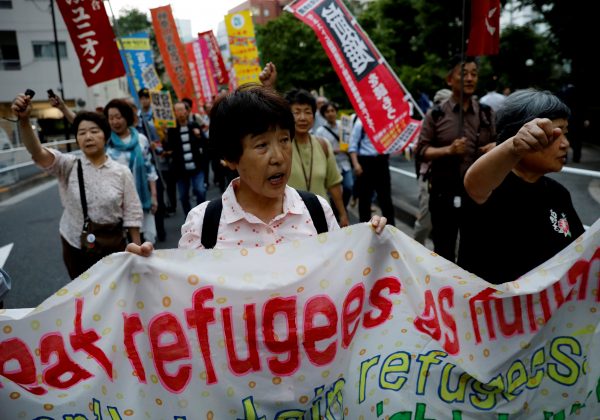In early June 2023, the Japanese Diet approved a set of controversial revisions to the Immigration Control and Refugee Recognition Act. Among other changes, it authorises the deportation of asylum seekers whose applications have been rejected twice.
Ostensibly, this is intended to close a ‘loophole’ in which migrants repeatedly apply for asylum and work using the temporary employment permit granted while their cases are under review. But the changes were decried by the political opposition, academics and civil society actors for opening the door to deporting innocent people back to almost certain harm.
The Immigration Services Agency has promised to increase the transparency of standards and criteria for asylum-seekers. But the new policy only further entrenches a highly opaque, arbitrary and largely unforgiving asylum system that resists international norms and robust protections in favour of case-by-case discretions.
Applicants face near-impossible standards for proof that prioritises translated and notarised ‘objective’ official documents at their own expense. Migrants also face the threat of arbitrary and indefinite immigration detention. Poor conditions and abuse in these detention centres have led to several high-profile deaths — such as that of Wishma Sandamali, a Sri Lankan woman who was detained after overstaying her student visa in 2021, and the suicide of an Italian man in 2022. Applicants also face the constant danger of being detained again without cause after release, contributing to an asylum approval rate of less than 1 per cent.
The creation of the ‘quasi-refugee’ status to normalise the legal status of the approximately 2000 Ukrainian refugees taken in by Japan since the 2022 Russian invasion of Ukraine is another example of this regime in action. The 1951 Convention Relating to the Status of Refugees that Japan uses to define a refugee does not recognise military conflict as a valid reason to claim refugee status.
Ukrainians entering after Japan’s highly publicised ‘open arms’ declaration are formally recognised as ‘temporary visitors’ undertaking ‘special activities’. This uncharacteristically generous treatment has been critically juxtaposed with the cold shoulder given to other groups. Syrians, Kurds, Burmese and even former Afghan employees of the Japanese embassy in Kabul are trapped in repeated cycles of application, denial, detention and provisional release, disrupting their access to livelihood, education and even nationality.
Japan’s refugee regime is not an outlier, regionally. Many Asian states resist international refugee norms and, instead, tolerate or instrumentalise asylum policies to balance the pursuit of national interests with political and social stability concerns.
Only a few sources of effective pressure to change the status quo exist. International pressure and optics have been a decisive factor in both of the cases where Japan made an exception to its generally strict policies. In addition to Ukrainians fleeing the ongoing conflict, Japan was subject to heavy criticism in the 1970s–80s for its reluctance to accept refugees fleeing the Vietnam War. Japan eventually gave in and resettled over 10,000 refugees — ten times more than the total number of approvals from 1982 to 2022 — and ratified the 1951 Convention Relating to the Status of Refugees.
But concerted international pressure for a systemic change in Japan’s asylum regime is unlikely in the current political climate. This is due to both the West’s grave mishandling of its own asylum and refugee challenges in the Mediterranean, Middle East, Latin America and elsewhere, as well as Japan’s importance as a close security partner in Asia.
Domestic potential for change lies in two areas, each with their own significant challenges. Japanese migrant rights organisations — such as the Japan Association for Refugees and the Solidarity Network with Migrants Japan — have been active in organising against the government revisions. They have also used the language of human rights and international norms to link the rights of asylum applicants to the broader citizens’ and workers’ rights movement.
But the lack of a viable and united political opposition to the ruling Liberal Democratic Party limits the routes through which significant legislative reform can be brought to the table.
Some migrant rights lawyers have publicly mused the possibility of bringing a legal challenge to Japan’s asylum rules. This route has a rocky history. While small individual victories are possible, sweeping challenges — such as the success of declaring indefinite immigration detention as unconstitutional in Taiwan and South Korea — have not yet materialised in Japan.
What is needed is a comprehensive reform of the asylum regime and a transparent evaluation process that recognises a wider and more accessible range of evidence. Although such reform prospects seem dim, it does not need to be justified solely through humanitarian appeals and international norms.
Any significant change will likely require a broader recognition among Japan’s leadership that accepting refugees can contribute positively to the country’s demographic and labour market woes, uphold the country’s international obligations and bolster its reputation as a democratic leader.
Yunchen Tian is Assistant Professor of Political Science at Saint Martin’s University, Lacey, Washington.

